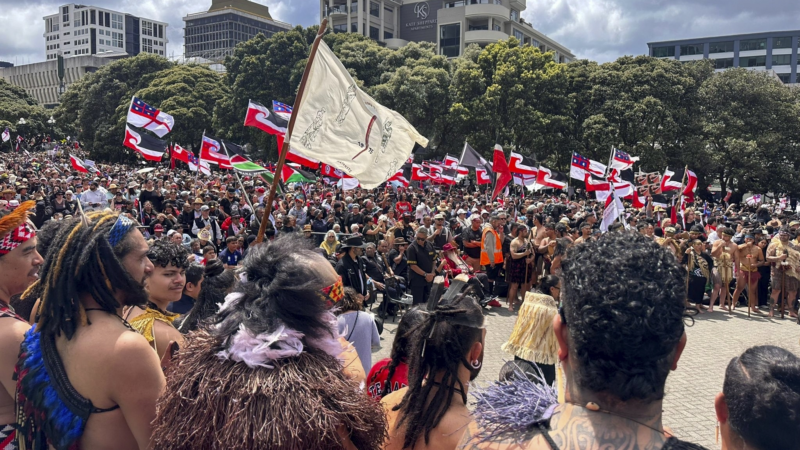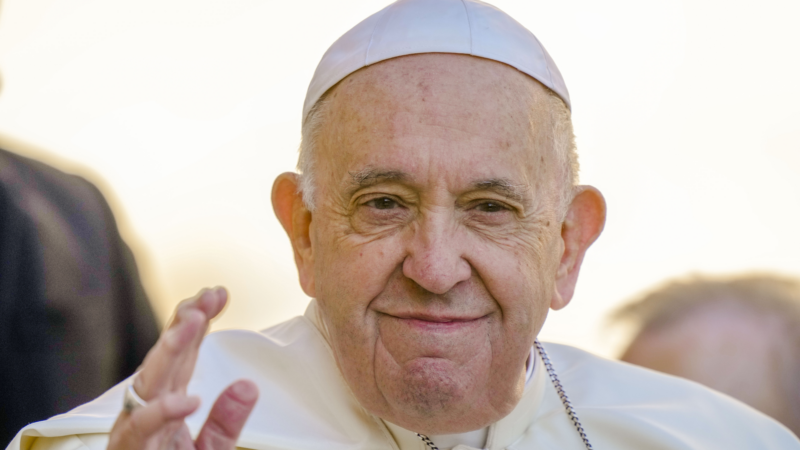42,000 crowd New Zealand’s Parliament grounds in support of Māori rights
WELLINGTON, New Zealand — As tens of thousands of marchers crowded the streets in New Zealand’s capital Wellington on Tuesday, the throng of people, flags aloft, had the air of a festival or a parade rather than a protest. They arrived to oppose a law that would reshape the county’s founding treaty between Indigenous Māori and the British Crown. But for many, it was about something more: a celebration of a resurging Indigenous language and identity that colonization had once almost destroyed.
“Just fighting for the rights that our tūpuna, our ancestors, fought for,” Shanell Bob said as she waited for the march to begin. “We’re fighting for our tamariki, for our mokopuna, so they can have what we haven’t been able to have,” she added, using the Māori words for children and grandchildren.
What was likely the country’s largest-ever protest in support of Māori rights — a subject that has preoccupied modern New Zealand for much of its young history — followed a long tradition of peaceful marches the length of the country that have marked turning points in the nation’s story.

“We’re going for a walk!” One organizer proclaimed from the stage as crowds gathered at the opposite end of the city from the nation’s Parliament. Some had traveled the length of the country over the past nine days.
For many, the turnout reflected growing solidarity on Indigenous rights from non-Māori. At bus stops during the usual morning commute, people of all ages and races waited with Māori sovereignty flags. Some local schools said they would not register students as absent. The city’s mayor joined the protest.
The bill that marchers were opposing is unpopular and unlikely to become law. But opposition to it has exploded, which marchers said indicated rising knowledge of the Treaty of Waitangi’s promises to Māori among New Zealanders — and a small but vocal backlash from those who are angered by the attempts of courts and lawmakers to keep them.
Māori marching for their rights as outlined in the treaty is not new. But the crowds were larger than at treaty marches before and mood was changed, Indigenous people said.

“It’s different to when I was a child,” Bob said. “We’re stronger now, our tamariki are stronger now, they know who they are, they’re proud of who they are.”
As the marchers moved through the streets of Wellington with ringing Māori haka — rhythmic chants — and waiata, or songs, thousands more holding signs lined the pavement in support.
Some placards bore jokes or insults about the lawmakers responsible for the bill, which would change the meaning of the principles of the 1840 Treaty of Waitangi and prevent them from applying only to Māori — whose chiefs signed the document when New Zealand was colonized.
But others read “proud to be Māori” or acknowledged the bearer’s heritage as a non-Māori person endorsing the protest. Some denounced the widespread expropriation of Māori land during colonization, one of the main grievances arising from the treaty.
“The treaty is a document that lets us be here in Aotearoa so holding it up and respecting it is really important,” said Ben Ogilvie, who is of Pākehā or New Zealand European descent, using the Māori name for the country. “I hate what this government is doing to tear it down.”

Police said 42,000 people tried to crowd into Parliament’s grounds, with some spilling into the surrounding streets. People crammed themselves onto the children’s slide on the lawn for a vantage point; others perched in trees. The tone was almost joyful; as people waited to leave the cramped area, some struck up Māori songs that most New Zealanders learn at school.
A sea of Māori sovereignty flags in red, black and white stretched down the lawn and into the streets. But marchers bore Samoan, Tongan, Indigenous Australian, U.S., Palestinian and Israeli flags, too. At Parliament, speeches from political leaders drew attention to the reason for the protest — a proposed law that would change the meaning of words in the country’s founding treaty, cement them in law and extend them to everyone.

Its author, libertarian lawmaker David Seymour — who is Māori — says the process of redress for decades of Crown breaches of its treaty with Māori has created special treatment for Indigenous people, which he opposes.
The bill’s detractors say it would spell constitutional upheaval, dilute Indigenous rights, and has provoked divisive rhetoric about Māori — who are still disadvantaged on almost every social and economic metric, despite attempts by the courts and lawmakers in recent decades to rectify inequities caused in large part by breaches of the treaty.
It is not expected to ever become law, but Seymour made a political deal that saw it shepherded through a first vote last Thursday. In a statement Tuesday, he said the public could now make submissions on the bill — which he hopes will reverse in popularity and experience a swell of support.
Seymour briefly walked out onto Parliament’s forecourt to observe the protest, although he was not among the lawmakers invited to speak. Some in the crowd booed him.
The protest was “a long time coming,” said Papa Heta, one of the marchers, who said Māori sought acknowledgement and respect.
“We hope that we can unite with our Pākehā friends, Europeans,” he added. “Unfortunately there are those that make decisions that put us in a difficult place.”
Party City files for bankruptcy and plans to shutter nationwide
Party City was once unmatched in its vast selection of affordable celebration goods. But over the years, competition stacked up at Walmart, Target, Spirit Halloween, and especially Amazon.
Sudan’s biggest refugee camp was already struck with famine. Now it’s being shelled
The siege, blamed on the Rapid Support Forces, has sparked a new humanitarian catastrophe and marks an alarming turning point in the Darfur region, already overrun by violence.
FDA approves weight loss drug Zepbound to treat obstructive sleep apnea
The FDA said studies have shown that by aiding weight loss, Zepbound improves sleep apnea symptoms in some patients.
Netflix is dreaming of a glitch-free Christmas with 2 major NFL games set
It comes weeks after Netflix's attempt to broadcast live boxing between Jake Paul and Mike Tyson was rife with technical glitches.
Opinion: The Pope wants priests to lighten up
A reflection on the comedy stylings of Pope Francis, who is telling priests to lighten up and not be so dour.
The FDA restricts a psychoactive mushroom used in some edibles
The Food and Drug Administration has told food manufacturers the psychoactive mushroom Amanita muscaria isn't authorized for food, including edibles, because it doesn't meet safety standards.







